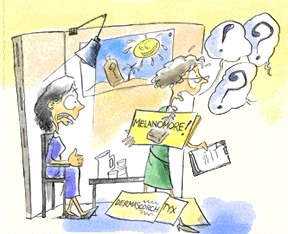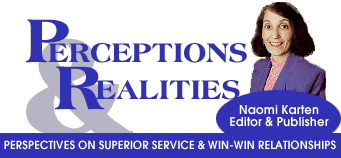Rx: Suntan Lotion

Do you conduct customer interviews? If so, I hope you avoid
the mistakes made by a woman who interviewed me at the local
mall. The subject: Consumer preferences for the name of a new
suntan lotion.
The woman approached me, clipboard in hand, and asked if Iíd
mind being interviewed. She assured me it would take only a few
minutes. When I agreed (how could she know that Iím always on the
lookout for case study material?), she invited me to a tiny,
doorless cubicle in an office on the lower level of the mall.
She began by showing me a list of proposed names of a new
suntan lotion and asking me to recite them. They all sounded like
medicine youíd take after your suntan lotion failed to do its
job.
A series of questions followed. What did each of these names
suggest to me? (Medicine!) What came to mind when I thought of
each of them? (Medicine!) Which of several factors are important
to me in selecting a suntan lotion? (It shouldnít remind me of
medicine!!) You get the idea.
What made this experience a case study, though, was not these
off-putting names, but the unprofessional way she conducted the
interview. Throughout the interview, staff members kept poking
their heads into our cubicle, shouting questions at my
interviewer. Repeatedly, she interrupted the interview to help
them.
At several points, she even left the cubicle to resolve
problems. Each time she returned, she apologized and told me how
grateful she was for my participation. Itíll only take a few
minutes longer, she repeated for the umpteenth time.
My poor interviewer became so flustered by the commotion that
she read aloud not only the instructions for the interviewee, but
also the interviewerís instructions ("Allow the respondent
to give multiple responses to this question."). She was the
supervisor, she explained, and her client was demanding results,
but some of her staff hadnít shown up and she was trying to do
two jobs. I could appreciate her plight -- who hasnít faced staff
shortages? Still, if you want to appear professional, do the
opposite of what she did.
For example, conduct your interviews in a place thatís free of
distractions and interruptions. Strive to appear relaxed and
confident, even if your insides are trying out for the pole
vaulting team. Prepare for the interview. Reading from a script
is fine, but it shouldnít sound as if youíre just reading it for
the first time. If things go wrong, donít call undue attention to
them. Repeated apologies, even though well-intended, are just
plain annoying. Before you begin the interview, state how long
itíll take Ė and then stick to that time commitment. (My
interview took about four minutes; the interruptions extended it
to 30).
When the interview ended, my interviewer again thanked me
profusely, apologized for taking so much of my time, and gave me
a coupon book with discounts at local stores and restaurants. The
expiration date was two days later. When I pointed this out, she
apologized again and accompanied me back upstairs to Mall
Central.
I donít know why, but I often think of her on SPF45 days.

